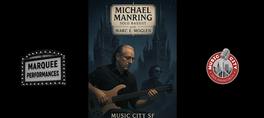The music of Kacy and Clayton exists outside of time, and burgeons with beautiful contradictions. It’s psychedelic and traditional, contemporary and vintage, melancholic and joyous. All at once, it showcases a slightly psych-folk sound of Linda Perhacs, Fleet Foxes, and First Aid Kit; rare country blues records and English folk tunes; and 1920s disaster songs and murder ballads. Their songs often are sugar-coated pills, tales of murderous jealousy, dilapidated graveyards, and infanticide, all delivered with Kacy Anderson’s sweet, lithe voice, and Clayton Linthicum’s hypnotic fingerpicking.Their latest album, Strange Country, strays away from straightforward folk, delivering a sound that pairs Laurel Canyon vibes with Dustbowl-era drama. And for the duo, the subject matter is literally close to home. They’re second cousins who have grown up in the Wood Mountain Uplands, an isolated region of souther Saskatchewan. It is ranch country, very remote, with a landscape punctuated with hills, 12 miles from the Montana border. Neighbors were scarce, and their school bus ride was a long drive into town.”Where we come from it’s kind of a step behind society,” Kacy, 19, says. “We had a lot of time to take in our surroundings. Characters are still very strong.”They learned music by picking up rare vinyl at record stores — the closest, the 21-year-old Clayton says, was five hours away — and Kacy troweled through Wikipedia to discover long-forgotten bands and musicians. But even Internet was unreliable in their area. The remoteness of their town required many hours in the car, so the long trips became educational moments. “I found out about Doc Watson and The Carter Family from a tape that my grandpa had in his car,” Clayton says, “and I found out about Hank Snow and Bob Wills from a neighbor who came up on 1940s and ‘50s country music.”Clayton would experiment with instruments scattered in his great-uncle Carl’s basement, occasionally performing with Kacy and her sisters (Carl’s grandchildren). There wasn’t much of a conventional music scene where they lived. However, Kacy & Clayton spent most of their Sunday evenings at the seniors home performing with and for local geriatrics. To rehearse, the two cousins living six miles apart often illegally drove to each other’s houses before they had driver’s licenses.“We both started playign music because we were nerds about it,” Kacy jokes. “The history of music and reading biographies and things like that; learning about artists and traditions and styles. That is why we really like folk music.” Clayton continues: “With songwriting, it is more like travelling to a time. We are both obsessed with the old world. When we write songs we almost subconsciously think about an older world.”Kacy says they use music as a way to understand their own anscestors, resucitating folktales through their songs, stories recounted from mouths of family and community members. Their music is a way to bring those vanishing times back to life again. “Lots of our songs are inspired by old stories from our family,” she says. “The common ancestors Clayton and I share were ranchers that moved up from South Dakota and settled in the Saskatchewan hills we both live in now. Loneliness and seclusion, sickness and death; the stories are often tragic, yet all recounted with fondness.”Like their previous albums pay homage to music of yore, Strange Country was conceived under a similar influence. Their arrangements are enhanced with a fiddle, melodeon, Autoharp and occasionally a rhythm section. All Of tehir lyrics stem from the plain, regional language of folk songs, often telling the gossip of their tiny town. The rollicking “Brunswick Stew” was inspired by scandalous pregnancies that have happened in their community. Underneath the veneer of their idyllic town, gossip and hearsay reign, as a girl denies her pregnancy for months, then suddenly gives birth. Kacy wrote the dark, haunting “Dyin’ Bed Maker” on the fiddle, telling the story of a woman who kills another woman for having an affair with her man. “I am not a murderous person,” she laughs, “I do love murder ballads though. Most murder ballads have a crazy man and an innocent girl and she is in love with him and he takes her to the mountains and kills her. It is always a pitiful story about a weak woman. I like the stories where the woman is the murderer. It’s saying ‘We are not weak we are gonna fucking murder you.’”Their music has resonated far beyond Saskatchewan, earning them fans culled from their long tours across North America and the U.K. Clayton says it was a surprise to see that people in cities outside their small town connected with the music they loved. “You get the young record collecting nerds like us that come out,” he says, “and the more obsessive older crowds that were like those younger people 45 years ago.”Clayton says their stripped-down sound is an iconoclastic thing in the age of overproduced albums. There’s something defiant about just a guitar and vocals, breaking away from the present to create a world from the past. As Clayton surmises: “The most rebellious thing you can do is rebel against the rebellion.”
show less
The music of Kacy and Clayton exists outside of time, and burgeons with beautiful contradictions. It’s psychedelic and traditional, contemporary and vintage, melancholic and joyous. All at once, it showcases a slightly psych-folk sound of Linda Perhacs, Fleet Foxes, and First Aid Kit; rare country blues records and English folk tunes; and 1920s disaster songs and murder ballads. Their songs often are sugar-coated pills, tales of murderous jealousy, dilapidated graveyards, and infanticide, all delivered with Kacy Anderson’s sweet, lithe voice, and Clayton Linthicum’s hypnotic fingerpicking.Their latest album, Strange Country, strays away from straightforward folk, delivering a sound that pairs Laurel Canyon vibes with Dustbowl-era drama. And for the duo, the subject matter is literally close to home. They’re second cousins who have grown up in the Wood Mountain Uplands, an isolated region of souther Saskatchewan. It is ranch country, very remote, with a landscape punctuated with hills, 12 miles from the Montana border. Neighbors were scarce, and their school bus ride was a long drive into town.”Where we come from it’s kind of a step behind society,” Kacy, 19, says. “We had a lot of time to take in our surroundings. Characters are still very strong.”They learned music by picking up rare vinyl at record stores — the closest, the 21-year-old Clayton says, was five hours away — and Kacy troweled through Wikipedia to discover long-forgotten bands and musicians. But even Internet was unreliable in their area. The remoteness of their town required many hours in the car, so the long trips became educational moments. “I found out about Doc Watson and The Carter Family from a tape that my grandpa had in his car,” Clayton says, “and I found out about Hank Snow and Bob Wills from a neighbor who came up on 1940s and ‘50s country music.”Clayton would experiment with instruments scattered in his great-uncle Carl’s basement, occasionally performing with Kacy and her sisters (Carl’s grandchildren). There wasn’t much of a conventional music scene where they lived. However, Kacy & Clayton spent most of their Sunday evenings at the seniors home performing with and for local geriatrics. To rehearse, the two cousins living six miles apart often illegally drove to each other’s houses before they had driver’s licenses.“We both started playign music because we were nerds about it,” Kacy jokes. “The history of music and reading biographies and things like that; learning about artists and traditions and styles. That is why we really like folk music.” Clayton continues: “With songwriting, it is more like travelling to a time. We are both obsessed with the old world. When we write songs we almost subconsciously think about an older world.”Kacy says they use music as a way to understand their own anscestors, resucitating folktales through their songs, stories recounted from mouths of family and community members. Their music is a way to bring those vanishing times back to life again. “Lots of our songs are inspired by old stories from our family,” she says. “The common ancestors Clayton and I share were ranchers that moved up from South Dakota and settled in the Saskatchewan hills we both live in now. Loneliness and seclusion, sickness and death; the stories are often tragic, yet all recounted with fondness.”Like their previous albums pay homage to music of yore, Strange Country was conceived under a similar influence. Their arrangements are enhanced with a fiddle, melodeon, Autoharp and occasionally a rhythm section. All Of tehir lyrics stem from the plain, regional language of folk songs, often telling the gossip of their tiny town. The rollicking “Brunswick Stew” was inspired by scandalous pregnancies that have happened in their community. Underneath the veneer of their idyllic town, gossip and hearsay reign, as a girl denies her pregnancy for months, then suddenly gives birth. Kacy wrote the dark, haunting “Dyin’ Bed Maker” on the fiddle, telling the story of a woman who kills another woman for having an affair with her man. “I am not a murderous person,” she laughs, “I do love murder ballads though. Most murder ballads have a crazy man and an innocent girl and she is in love with him and he takes her to the mountains and kills her. It is always a pitiful story about a weak woman. I like the stories where the woman is the murderer. It’s saying ‘We are not weak we are gonna fucking murder you.’”Their music has resonated far beyond Saskatchewan, earning them fans culled from their long tours across North America and the U.K. Clayton says it was a surprise to see that people in cities outside their small town connected with the music they loved. “You get the young record collecting nerds like us that come out,” he says, “and the more obsessive older crowds that were like those younger people 45 years ago.”Clayton says their stripped-down sound is an iconoclastic thing in the age of overproduced albums. There’s something defiant about just a guitar and vocals, breaking away from the present to create a world from the past. As Clayton surmises: “The most rebellious thing you can do is rebel against the rebellion.”
read more
show less
Date/Times:
Cafe du Nord
1 Upcoming Events
2174 Market Street, San Francisco, CA 94114
The Best Events
Every Week in Your Inbox
From Our Sponsors
UPCOMING EVENTS
Great suggestion! We'll be in touch.
Event reviewed successfully.









